-
 Bitcoin
Bitcoin $119000
-2.21% -
 Ethereum
Ethereum $4315
1.01% -
 XRP
XRP $3.151
-3.11% -
 Tether USDt
Tether USDt $0.0000
0.00% -
 BNB
BNB $808.5
-0.71% -
 Solana
Solana $175.8
-4.21% -
 USDC
USDC $0.9999
0.00% -
 Dogecoin
Dogecoin $0.2250
-3.92% -
 TRON
TRON $0.3469
1.77% -
 Cardano
Cardano $0.7818
-3.81% -
 Chainlink
Chainlink $21.47
-2.10% -
 Hyperliquid
Hyperliquid $43.30
-6.81% -
 Stellar
Stellar $0.4370
-2.84% -
 Sui
Sui $3.682
-4.40% -
 Bitcoin Cash
Bitcoin Cash $590.8
2.67% -
 Hedera
Hedera $0.2484
-5.20% -
 Ethena USDe
Ethena USDe $1.001
0.00% -
 Avalanche
Avalanche $23.10
-4.29% -
 Litecoin
Litecoin $119.2
-3.96% -
 Toncoin
Toncoin $3.409
0.90% -
 UNUS SED LEO
UNUS SED LEO $9.016
-1.29% -
 Shiba Inu
Shiba Inu $0.00001304
-3.82% -
 Uniswap
Uniswap $11.18
1.33% -
 Polkadot
Polkadot $3.913
-3.51% -
 Cronos
Cronos $0.1672
-3.08% -
 Dai
Dai $1.000
0.02% -
 Ethena
Ethena $0.7899
-4.70% -
 Bitget Token
Bitget Token $4.400
-1.23% -
 Pepe
Pepe $0.00001132
-5.93% -
 Monero
Monero $257.9
-6.44%
What fees are deducted daily for perpetual contract trading?
Perpetual contract traders incur daily fees such as transaction fees, funding rates, insurance funds, maker and taker fees, margin interest, overnight swaps, and withdrawal fees.
Dec 12, 2024 at 08:35 pm
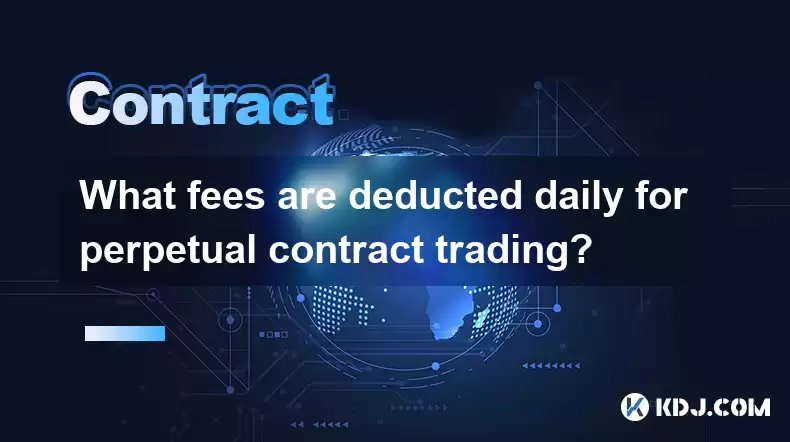
What Fees Are Deducted Daily for Perpetual Contract Trading?
Perpetual contracts are a type of derivative financial instrument that provides traders with exposure to the price of an underlying asset without the need to purchase or hold the asset itself. Unlike traditional futures contracts, perpetual contracts do not have an expiration date and can be traded indefinitely.
As with any financial instrument, there are various costs associated with trading perpetual contracts, including daily fees that are deducted from traders' accounts. These fees can vary depending on the exchange where the contract is traded, the specific contract being traded, and the trader's trading volume and account tier.
Here are the detailed explanations of each daily fee as following:
1. Transaction Fees:
Transaction fees are charges levied on each trade executed on the exchange. These fees can vary depending on the trading platform, and may be a flat fee, a percentage of the trade value, or a combination of both. For instance, Binance charges a trading fee of 0.02% for each transaction, while the fee schedule on FTX starts at 0.02% and decreases based on trading volume and account tier.
2. Funding Rates:
Funding rates are daily payments made between traders on opposite sides of a perpetual contract position. They are designed to ensure that the perpetual contract price tracks the spot price of the underlying asset closely. When the funding rate is positive, long positions pay short positions, and vice versa. Funding rates can fluctuate depending on market conditions and the demand and supply dynamics of the contract.
3. Insurance Funds:
Insurance funds are a precautionary measure to cover potential losses in the event of a liquidation or a failed trade. When a trader's margin balance falls below a certain threshold, the insurance fund may be utilized to cover the deficit and prevent the trader from being liquidated. Insurance fund fees are typically a small percentage of the trader's open positions and are deducted daily.
4. Maker and Taker Fees:
These are charges levied on traders based on their role in a trade. Makers are traders who place limit orders that add liquidity to the market, while takers are traders who execute market orders that remove liquidity. Maker fees are typically lower than taker fees, as exchanges incentivize traders to provide liquidity to the market.
5. Margin Interest:
When using margin trading, traders borrow funds from the exchange to increase their trading leverage. Margin interest is a fee charged on the borrowed funds, and is typically calculated as a percentage of the loan amount and the loan duration. Margin interest fees are deducted from the trader's account daily.
6. Overnight Swaps:
Overnight swaps are fees charged to traders who hold positions overnight. They are designed to harmonize the perpetual contract price with the spot market price of the underlying asset. Overnight swap fees can be positive or negative, depending on the price movement of the underlying asset and the current funding rate.
7. Withdrawal Fees:
When traders withdraw their funds from the exchange, they may incur a withdrawal fee. This fee varies depending on the exchange, the withdrawal method chosen, and the amount being withdrawn. Withdrawal fees are typically a flat fee, but may also be a percentage of the withdrawal amount.
In addition to these daily fees, traders may also incur other costs, such as network fees and gas fees, which can vary depending on the blockchain network used for the transaction.
To minimize the impact of fees on their trading profits, traders should carefully consider their trading strategy, account tier, and exchange selection. They should also stay updated on the latest fee schedules and market conditions to make informed trading decisions that maximize their returns and minimize their costs.
Disclaimer:info@kdj.com
The information provided is not trading advice. kdj.com does not assume any responsibility for any investments made based on the information provided in this article. Cryptocurrencies are highly volatile and it is highly recommended that you invest with caution after thorough research!
If you believe that the content used on this website infringes your copyright, please contact us immediately (info@kdj.com) and we will delete it promptly.
- PumpFun (PUMP) Price: Riding the Meme Coin Wave or Facing a Wipeout?
- 2025-08-12 16:50:12
- Uniswap's Legal Clarity Fuels Price Target: Will UNI Hit $12.85?
- 2025-08-12 17:30:13
- Arctic Pablo Coin: Meme Coin Growth Redefined?
- 2025-08-12 16:50:12
- Pumpfun, Snorter Token, and Meme Coin Mania: What's the Hype?
- 2025-08-12 17:30:13
- Crypto, Long-Term, Small Investment: Finding Gems in the Digital Rough
- 2025-08-12 17:35:12
- Do Kwon's Terra Collapse: Guilty Plea Looms – A Stablecoin Fraud Saga
- 2025-08-12 17:40:12
Related knowledge
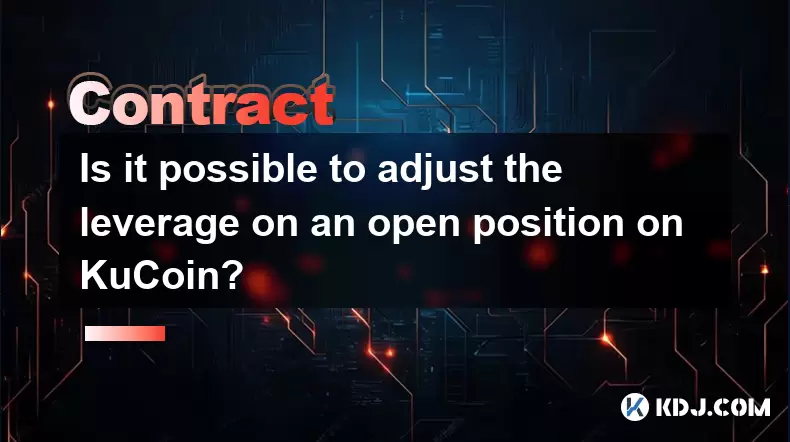
Is it possible to adjust the leverage on an open position on KuCoin?
Aug 09,2025 at 08:21pm
Understanding Leverage in KuCoin Futures TradingLeverage in KuCoin Futures allows traders to amplify their exposure to price movements by borrowing fu...

What cryptocurrencies are supported as collateral on KuCoin Futures?
Aug 11,2025 at 04:21am
Overview of KuCoin Futures and Collateral MechanismKuCoin Futures is a derivatives trading platform that allows users to trade perpetual and delivery ...
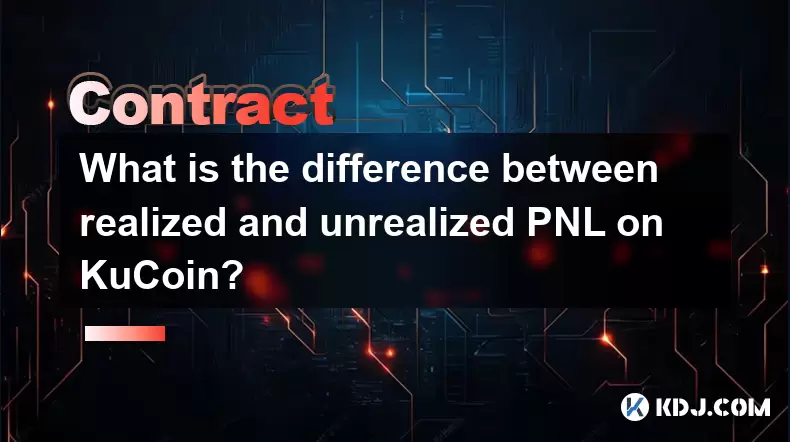
What is the difference between realized and unrealized PNL on KuCoin?
Aug 09,2025 at 01:49am
Understanding Realized and Unrealized PNL on KuCoinWhen trading on KuCoin, especially in futures and perpetual contracts, understanding the distinctio...

How does KuCoin Futures compare against Binance Futures in terms of features?
Aug 09,2025 at 03:22am
Trading Interface and User ExperienceThe trading interface is a critical component when comparing KuCoin Futures and Binance Futures, as it directly i...
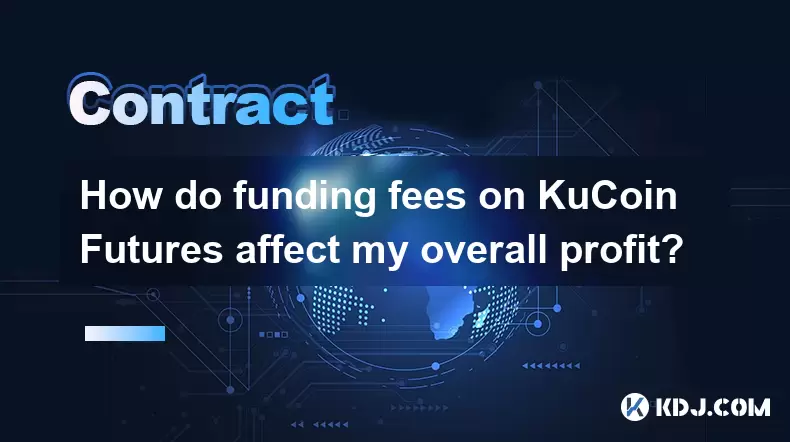
How do funding fees on KuCoin Futures affect my overall profit?
Aug 09,2025 at 08:22am
Understanding Funding Fees on KuCoin FuturesFunding fees on KuCoin Futures are periodic payments exchanged between long and short position holders to ...
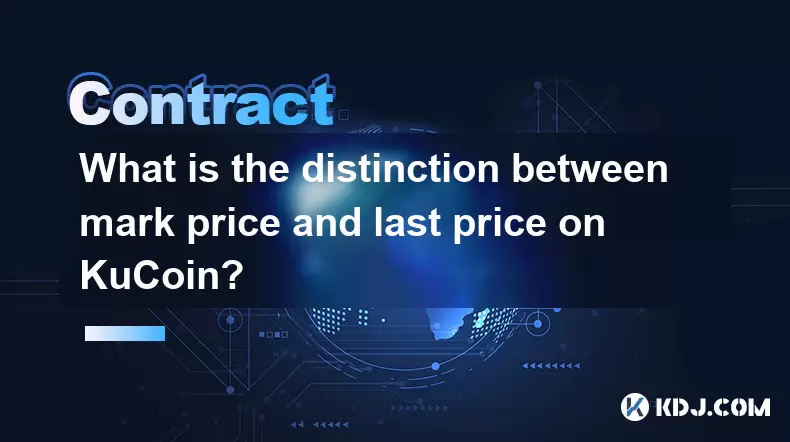
What is the distinction between mark price and last price on KuCoin?
Aug 08,2025 at 01:58pm
Understanding the Basics of Price in Cryptocurrency TradingIn cryptocurrency exchanges like KuCoin, two key price indicators frequently appear on trad...

Is it possible to adjust the leverage on an open position on KuCoin?
Aug 09,2025 at 08:21pm
Understanding Leverage in KuCoin Futures TradingLeverage in KuCoin Futures allows traders to amplify their exposure to price movements by borrowing fu...

What cryptocurrencies are supported as collateral on KuCoin Futures?
Aug 11,2025 at 04:21am
Overview of KuCoin Futures and Collateral MechanismKuCoin Futures is a derivatives trading platform that allows users to trade perpetual and delivery ...

What is the difference between realized and unrealized PNL on KuCoin?
Aug 09,2025 at 01:49am
Understanding Realized and Unrealized PNL on KuCoinWhen trading on KuCoin, especially in futures and perpetual contracts, understanding the distinctio...

How does KuCoin Futures compare against Binance Futures in terms of features?
Aug 09,2025 at 03:22am
Trading Interface and User ExperienceThe trading interface is a critical component when comparing KuCoin Futures and Binance Futures, as it directly i...

How do funding fees on KuCoin Futures affect my overall profit?
Aug 09,2025 at 08:22am
Understanding Funding Fees on KuCoin FuturesFunding fees on KuCoin Futures are periodic payments exchanged between long and short position holders to ...

What is the distinction between mark price and last price on KuCoin?
Aug 08,2025 at 01:58pm
Understanding the Basics of Price in Cryptocurrency TradingIn cryptocurrency exchanges like KuCoin, two key price indicators frequently appear on trad...
See all articles

























































































